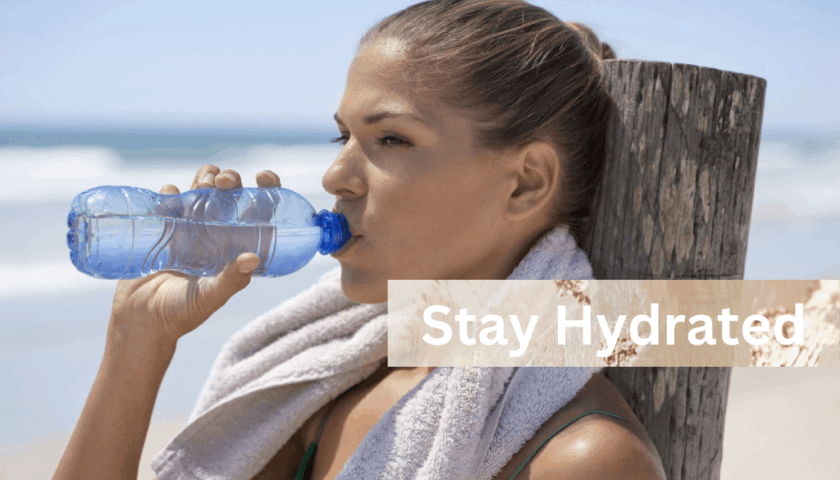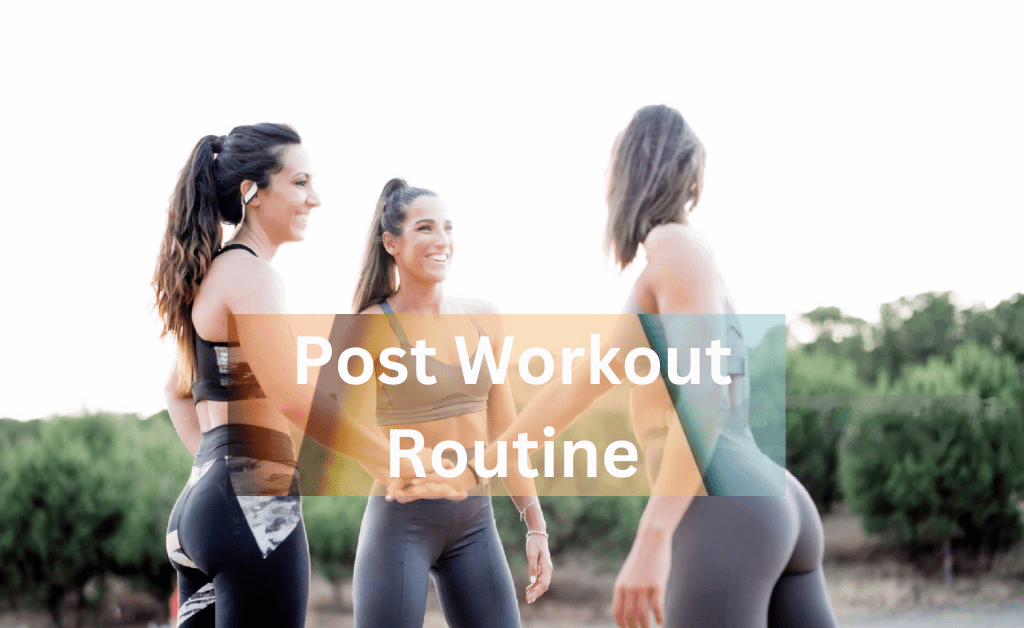Post workout routine is critical for achieving good outcomes, particularly weight reduction and muscle development, yet reducing pain and loss. In addition to restoring your vitality, a post workout routine helps you keep optimal energy levels, which makes it simpler to comply with your workout plan.
This article examines what to do immediately after finishing a workout to deliver the best results. Continue reading to discover how to develop a successful strategy to begin your post-exercise rehabilitation.
Common Advice to Follow For Post Workout Routine:

Become Hydrated:
Rehydrating is crucial, primarily after a strenuous workout or if you’ve sweat a lot. Enhancing your liquid intake improves your muscles, reduces discomfort, and increases flexibility.
Get at least 16 ounces of water or a nutritious liquid, such as chocolate milk, green or black tea, or coconut water. Or you might go for a diet drink with less sugar. Electrolytes like sodium and potassium used in these drinks can help to; prevent and alleviate stiffness in the muscles.
Avoid excessively; sweet, alcoholic, and stimulant liquids since they can dehydrate you.
Eat Nutritional Snacks:
After the workout, allow yourself 40 minutes to take a nutritious snack or meal. It will help in; restoring the energy reserves in the muscles and begin the process of healing. In addition, take meals that are high in protein and carbs.
Glycogen levels are restored by carbs, allowing you to regain your energy. Protein supplies amino acids that help rebuild and repair muscles and speeds up; muscle recovery.
Magnesium Supplementation:
Magnesium is involved in almost every process your body requires to exercise and grow muscle, including protein synthesis, sensory function, blood glucose management, and energy generation.
Because we lose magnesium when we sweat during a workout, having to eat magnesium-rich foods like dark leafy greens, regular milk, almonds, cashews, sesame seeds, fish (like wild salmon and halibut), and avocado may be a great way to regenerate and rebuild your tired muscles, in other words; allowing you to get the most benefit from your gym workout.
If you get painful muscular contractions, Holmes believes this might be a warning that your creatinine levels are too low. “A lack of magnesium can trigger muscular cramps, but taking it after exertion can help to relax your muscles,” she explains. She also suggests taking an Epsom salt bath, which is rich in magnesium.
Holmes
On Days off, Continue the Modest Workout Routine:
You can still indulge in light exercise on rest days, like swimming, walking, or yoga, even though your muscles need recuperation time; after a hard session. Similarly, active recovery may improve blood circulation get rid of toxins, and avoid lactic acid development. You might target multiple muscle areas and use your muscles in; different ways by mixing up your workouts.
Remember to Breathe Yourself:
Always cool down after your workout so that; your heart rate can steadily return to normal. Above all, it helps prevent blood from swelling up in the lower regions, which can trigger breathlessness or nausea.
A decent cool down can also help in stress relief, injury prevention, and the reduction of discomfort in the muscles. Consider closing it with a 5-minute relaxed position to improve all well-being.
Ideas For Muscle Growth:
Post Workout Routine on Consuming Protein:
Choose meals that; are rich in high proteins and balanced carbs to help your muscles recover and grow. Among some of the protein sources that may be; used to help to grow muscle are:
Lean meats, fish, whey protein, almonds, seeds, low-sugar protein snacks, eggs, cheese, and soy products.
Pick your Carbohydrates Carefully:
Proteins enhance muscle development, whereas carbohydrates aid in muscle recovery. Following an exercise, you should have fresh fruit, chocolate milk, sweet potatoes, whole wheat bread, oats, whole grain pasta, legumes, and quinoa.
Try to Use Boosters:
You can boost your diet by taking vitamins or a protein shake. Creatine, protein supplements, weight gainers, beta-alanine, branched-chain amino acids (BCAAs), and beta-hydroxy beta-methyl butyrate (HMB); are some of the supplements that stimulate muscle-building.
Post Workout Routine for Weight Loss:
Take Scheduled Meals:
Eat frequently and limit yourself from skipping nutritious meals since doing so might result in muscle loss, which could neutralize the advantages of your workout. Your metabolism will boost as a result of muscle growth, assisting in weight reduction.
Take into account the Specific Meals:
Choose meals that boost weight reduction to burn fat. Whole grains, fiery peppers, and low-fat dairy products are examples of it now. Fish rich in omega-3 fatty acids, such as salmon, mackerel, and tuna, are some of the protein choices. Alternatively, use lean meats like chicken breast, beef, or turkey.
Remedies for Muscle Stiffness:
Remember to Stretch:
Stretch your muscles after your workout while they’re still warm. It improves muscular strengthening, stress reduction, and flexibility. Above all, stretching also benefits in the prevention of pain and stiffness, the release of tension, and the expansion of your movement range. It increases mobility, helps proper posture, and encourages muscular relaxation.
Take a Refreshing Shower:
Take a tepid or cold shower to ease pain, reduce swelling, and alleviate muscle tension. You can also try an ice bath to relieve muscular inflammation and pain. It may also benefit you in achieving a comfortable night’s sleep.
Change your Outfit:
It appears to be a no-brainer, isn’t it? Perhaps you’re in such a hurry to get to the preschool break line that you don’t have enough time to change your clothes. Therefore, you’re getting ready for the day either at home; or work. Even if you aren’t able to; change your entire wardrobe, it is essential to; remove any wet clothing, such as your shirt, underwear, and socks. Wet training clothes can trap moisture, allowing fungus, yeast, bacteria, and viruses to develop. It can lead to rashes or skin infections.
Consider a Home Treatment:
Other methods for relieving or preventing muscular pain involve in; taking a salt bath, getting a massage or foam massaging. Take a proper rest unless you feel much better if you are fatigued, in pain, or suffering from an injury.
Post Workout Routine Requires You To Take a Good Massage:
The good news is: According to research, you should get a massage after your extensive workout. Massage can not only; accelerate recovery time, but it may also alleviate muscular soreness and enhance muscular strength after training – according to a 2017 study. Lemere believes that although working out the lactic acid that stores in your muscles might be unpleasant, the subsequent sweet relief is certainly; worth the temporary suffering.
Lemere
If you can’t justify having an expert massage you off after every training session, get in a foam roller and practice with some maneuvers at home. Rollers cost roughly $15-$20 online, and there is a variety of; free instructions on how to utilize them. “When applying these remedies, look for spots of stiffness and remain there until it vanishes,” Davis advises. “When performing self-massages, adequate breathing is necessary. Deliberate calm breathing can encourage your central nervous system to relax and allow your muscles to do the same.”
Davis
You could even find a self-massage gadget in your pet’s toy box. “I love using foam rollers and lacrosse/tennis balls as self-massage tools at home,” Davis says. Davis recommends the lacrosse or tennis ball for upper body muscles, stating that “it pin-points certain regions of stress around the shoulder blade and traps.”
Davis
What to Stay Away from?
Maintain a healthy balance in terms of nutrition. Ensure you are nourishing your body without eating too many calories. There is no need to limit yourself to anything. Avoid dieting or eliminating meals. It’s also essential to avoid overeating and taking your calories from bad, artificial meals.
Post Workout Routine Requires You To Limit Yourself Consuming Exotic Ingredients:
It could be challenging to figure out exactly which meals you ought to stop consuming after extensive exercise. Take the following rule into consideration: You shouldn’t take it if you are not aware of what the nutrients; are. Several food products are processed and stuffed with sugar and other toxins. If you decide to; eat cooked food, ensure that you have read the basic ingredient labels. If you do not even recognize more than four of these substances, skip them.

Stay away from Chili Food:
Spicy snacks ought to also be; ignored after training. Meals prepared with spicy chilies, such as chili peppers or red pepper – contain capsicum, a volatile ingredient that is uncomfortable to biological systems. Therefore, rich foods irritate digestion, which can; result in heartburn and gastrointestinal problems, notably after your body has exerted energy while in training. Since your body is striving to restore it, choosing nutrients that are easy to absorb is essential.
Post Workout Routine Needs You To Stay Away from Alcohol:
After a workout, drinking is; explicitly forbidden. It may appear exciting to have a festive drink after a strenuous workout however, drinking slows the process of healing workout muscle soreness by blocking the release of specific hormones that contribute to the recovery process, such as a hormone. Therefore, alcohol is a reliever, it will only extend your rehabilitation if you are; extremely dehydrated from the exercise.
In conclusion, beware of overtraining by pushing yourself too quickly or beyond your present level. Strains and injuries might result from this overexercise. For instance, it can also trigger dizziness, especially if you work out in an intense, bouncy, or non-friendly atmosphere. Or if you’ll quit exercising suddenly.
Dizziness or breathlessness can result from limiting your breath or missing breathing after and during a workout. Your brain is not receiving plenty of oxygen; consequently. Before going to work out, practice deep breathing techniques. By doing this, you’ll be able to develop mindful breathing and good breathing habits.
If you aren’t Catching Up a Post Workout Routine:
To leverage the benefits of your workout, you must respect and nurture your body by adhering to a post-workout routine and nutritional plan that are specifically designed through nutritional analysis. It enables you to keep your mental and physical wellness. You run the risk of; becoming injured, or fatigued if you do not establish after workout routine. In addition, you may find it harder to; keep to an exercise routine or have the stamina to finish your everyday tasks.
You may deviate from your post-workout stretch from time to time owing to a lack of time or other obligations, but you should typically follow the appropriate instructions as frequently as possible.
It’s also important; to respect your body and relax if you feel uncomfortable, fatigued, or in pain after training. To perform at your maximum the next time you work out, you must ensure that your body has been restored and rejuvenated. Above all, it enables your body to work at its full potential, allowing you to; go about your regular activities.
You’ll feel much better physically and boost your overall well-being, which will benefit you in all aspects of your life.
When to Consult a Professional For Post Workout Routine?
If you are new to training or have underlying health concerns like injuries, consider training with the best trainer. A gym professional may design a plan that is; customized to your routine requirements and goals. Above all, they will also advise you on the best way to go after your workout is; completed. As you improve, a trainer can make changes; to your routine to assist you in improving.

A nutritionist can examine your needs by evaluating your present eating habits, training routine, and desired outcomes. They will create an eating plan that is; customized to your fitness goals, dietary limitations, and health issues. Therefore, meeting a nutritionist could also help you feel encouraged and motivated as you work towards long-term goals.
General FAQs:
What should you not take right after intense training?
A few things that should not be consumed after an extensive workout, like alcohol or other fizzy drinks.
What food you should not prefer to eat or take after workout?
You should avoid taking sugar (exists in cookies and candies), and fried and high-fat foods.
Is it good or bad to sleep post-workout?
Yes, it is very nice to have good sleep that helps release muscle stress.
Should you take bath after a workout?
Yes, you can take warm and cool baths and consider it practice the most important part.
Should you gain weight if you sleep after an extensive workout?
No, it will not let you gain weight as there is no such study or research which proves that sleep can let you gain weight.
In a Nutshell:
To; achieve the maximum benefit and enable your muscles to heal, you must use the recovery process after a workout. Get lots of sleep in addition to these recommended steps to boost your performance and rehabilitation time. Allow yourself to; complete rest whenever you feel the need for it.
Establish a post-stretch workout recovery plan to; properly boost energy levels and restore muscles. Tweak your post-workout technique if you find yourself; being either too relaxed or too stiff.





